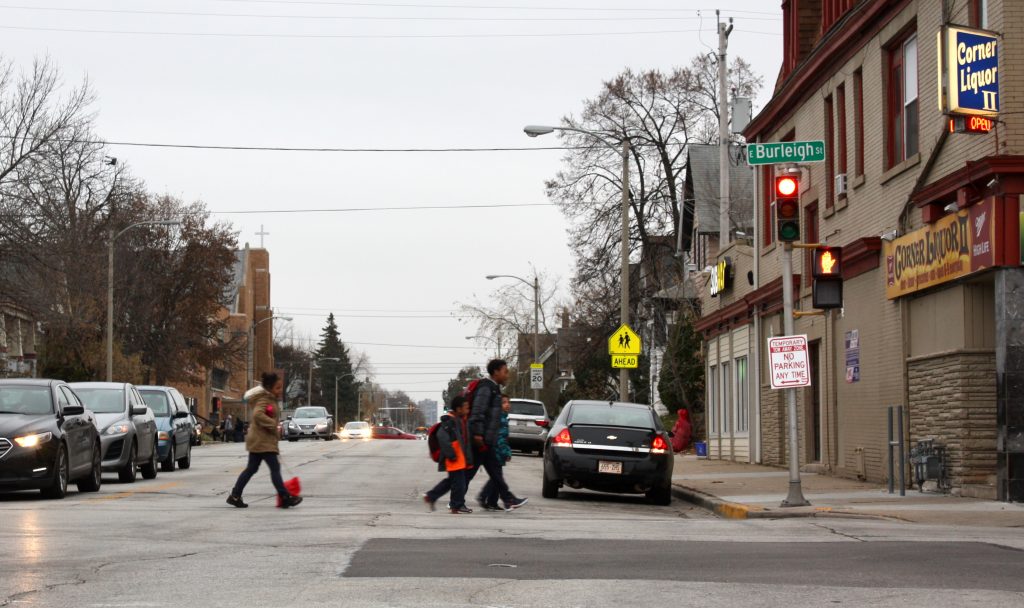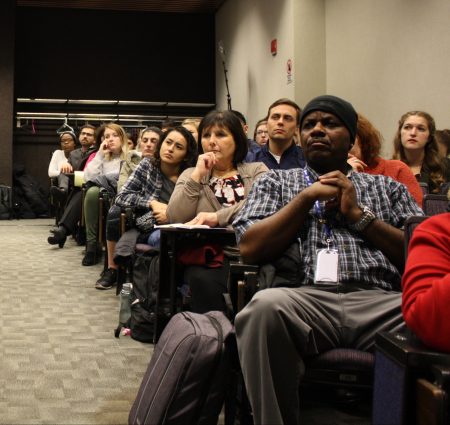Poverty Driving Epidemic of Childhood Trauma
Particularly potent in Milwaukee, with 40% of children below poverty line, experts note.
Twelve years — 4,380 days — is the difference in life expectancy between someone who lives in the 53217 ZIP code, Milwaukee’s healthiest, and 53206, which is infamous for its challenges.
According to City of Milwaukee Health Department Commissioner Bevan Baker, who shared the numbers at a recent panel on poverty at Marquette University, the disparity underscores the responsibility to address it.
“My heart just weeps,” he said. “And, it makes me wonder about the capacity of human beings to allow this to happen, to go home at night and sleep, peacefully, knowing that this exists.”
The two ZIP codes, only about a mile apart at their closest point, are stark in their differences. In 53206, the population is 94 percent black with an average age of about 29. In this, the most incarcerated ZIP code in the country, 47.5 percent of people and two-thirds of children live below the poverty line. In 53217 — where 87 percent of inhabitants are white, the average age is over 40 and only 5.3 percent of people live in poverty — the median household income of $99,268 is more than four times that of 53206.
Baker added, “There are young children who are waiting to stand on our shoulders … and we’ve failed.”
The panel of seven men, which included scientists and researchers as well as public health, law enforcement and philanthropic professionals, pointed to the adverse impact of prolonged stress on the brain and lack of resources available for mental health treatment. They stressed the importance of being more proactive in caring for individuals.
“The earlier you start, the better,” said Robert Fox, a Marquette University psychology professor and founder of the Behavior Clinic, a 15-year partnership with Penfield Children’s Center.
Fox, who works with poor, central city families, largely headed by single women, described living situations that lacked amenities and often included some type of trauma. According to Fox, one in 10 children in the country have a “behavior problem” as a result of trauma. One out of every four children under 5 lives below the poverty line. In Milwaukee, more than 40 percent of children (under 18) live below the poverty line. The Centers for Disease Control and Prevention (CDC) recognizes the conditions of poverty as a risk factor for trauma.
These experiences can lead to stunted growth. Many children who experience trauma have difficulty in school and, according to Milwaukee’s Chief Deputy District Attorney Kent Lovern, 80 percent of prisoners in the U.S. self-report that they were abused or neglected as children, or witnessed abuse or neglect in their household growing up.
John Schmid, an economics reporter at the Milwaukee Journal Sentinel who published a report on childhood trauma earlier this year, said the combination of poverty and a lack of mental health care creates a “downward, self-perpetuating dynamic” that can be difficult to address. “You can have all the make-work, cookie-cutter job programs and investment in job training in the world and … in many cases it won’t make a bit of a difference.”
According to a recent report, released by the Coalition on Human Needs and 9to5 Wisconsin, the state’s poverty rate dropped from 13.2 percent in 2014 to 11.8 percent last year. However, as of 2016, 32.9 percent of Wisconsin’s African-Americans were living in poverty. More than 660,000 Wisconsinites earn wages less than the federal poverty line and about 280,000 make less than half that amount.
“When we talk about children and the poverty that is happening to children, it is irresponsible not to also talk about how parents, heads of households, which are largely women, are not being supported,” said 9to5 Wisconsin State Director Astar Herndon in an interview. She did not attend the panel discussion.
According to the 9to5 report, child poverty cost the United States economy $672 billion in 2015. Almost two-thirds of households in 53206 are headed by single mothers, a figure exacerbated by the city’s disproportionate incarceration of black men.
Herndon also called race the “elephant in the room,” saying that it is “embedded in the fabric of this country.” American capitalism, she said, necessitates haves and have-nots and has branded people of color “the unspoken group that should never have.”
“The Holocaust happened. But there [were] also those who did nothing, said nothing and let it happen,” Baker told the audience. “So, yes, we need structural change, we need policies, but we also need people to speak up and … to recognize the horror of other people’s existence.”
Frank Cumberbatch, vice president of engagement at Bader Philanthropies, said it’s essential that the leadership of Milwaukee “get its act together.” He said people have to start talking to each other so resources can reach where they need to go.
“There’s no owner of the solution — it belongs to all of us.”
This story was originally published by Milwaukee Neighborhood News Service, where you can find other stories reporting on eighteen city neighborhoods in Milwaukee.
If you think stories like this are important, become a member of Urban Milwaukee and help support real, independent journalism. Plus you get some cool added benefits.



















Jabril, great reporting, many thanks.
It’s not just Milwaukee leadership that “needs to get its act together.” Many state-level policies — using TANF for work placement instead of childcare or actual monetary support of the most impoverished families, enforcing work requirements in localities with an insufficient number of jobs for low-skilled workers, cutting support for mass transit *out* of 53206 to better jobs — are directly responsible for pushing and keeping people down. The *state* and the *region* must acknowledge the racism that diverts needed resources away from Milwaukee. And once acknowledged, get out of the way.
Where are the comments?? I will post what the story itself say and it is clear that yes “poverty” is an issue BUT it is NOT the controlling issue. Below are two paragraphs from the story that must be understood and ACTED UPON to begin to process of Milwaukee “getting its act together”
Those children who have suffered trauma/abuse/brutalization MUST be healed so THEY can begin to learn again, Yes the “the leadership of Milwaukee” must “get its act together” for the sake of the kid.
Fox, who works with poor, central city families, largely headed by single women, described living situations that lacked amenities and often included some type of trauma. According to Fox, one in 10 children in the country have a “behavior problem” as a result of trauma. One out of every four children under 5 lives below the poverty line. In Milwaukee, more than 40 percent of children (under 18) live below the poverty line. The Centers for Disease Control and Prevention (CDC) recognizes the conditions of poverty as a risk factor for trauma.
These experiences can lead to stunted growth. Many children who experience trauma have difficulty in school and, according to Milwaukee’s Chief Deputy District Attorney Kent Lovern, 80 percent of prisoners in the U.S. self-report that they were abused or neglected as children, or witnessed abuse or neglect in their household growing up.
Thomas, what are the first steps you think Milwaukee should take?
It depends where you are at but for starters understanding that violent behavior starts with UNRESOLVED abuse/trauma/brutalization and that those who are so “infected” MUST be healed. Now if you are there then we can begin to build on that base. If not then we have to have the discussion about how UNRESOLVED abuse/trauma/brutalization is the basis for violent behavior.
Call me with questions etc 414 403 1341 Peace Tom
Thomas, would suggest you don’t put your phone number where bots can scrape it.
Antidote to Deficit Phobia is an excellent four-page introduction into where funding for programs that you support should come.
https://docs.wixstatic.com/ugd/f4c1a3_6b35b43a6aba48028d77f08750e05382.pdf
Same idea here, but in a format that appeals even more to conservatives, “Taxes For Revenue Are Obsolete.”
https://www.huffingtonpost.com/warren-mosler/taxes-for-revenue-are-obs_b_542134.html
What is now know as Modern Monetary Theory goes back to at least 1946, a former Chair of the Federal Reserve Bank of New York, Beardsley Ruml. Note, no one is saying taxes are obsolete. They aren’t. The federal government, however, does not need them for revenue.
IMHO, MKE can do nothing about the issues you raise, because it can’t afford to. The federal government can and should.
The vast majority of federal welfare goes to Wall Street and the elites. Defense spending–most of that to for profit contractors–is way behind.
http://urbanmilwaukee.com/2017/11/21/poverty-driving-epidemic-of-childhood-trauma/#comment-1387137
John any thoughts on first step?? Peace